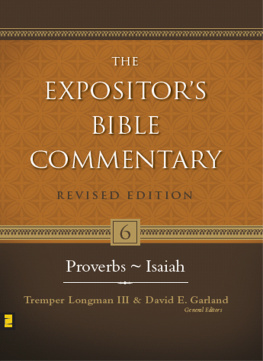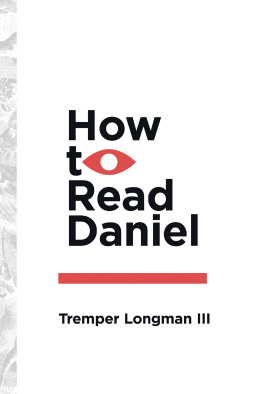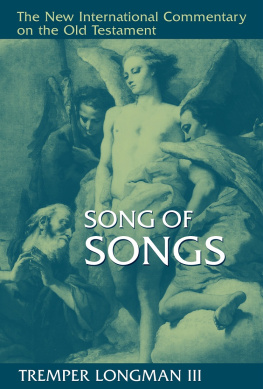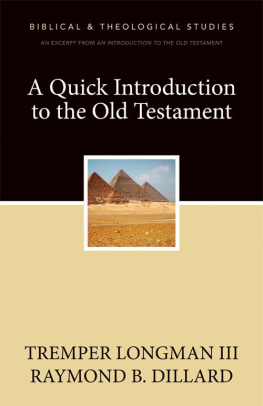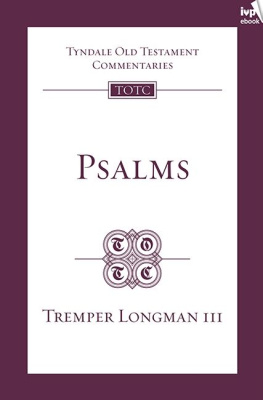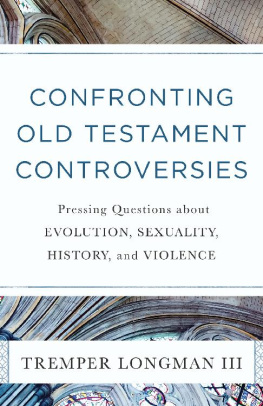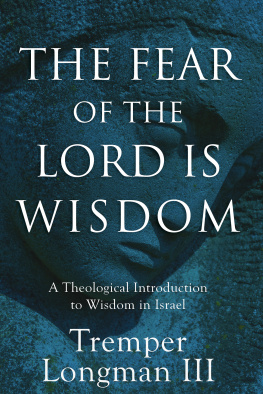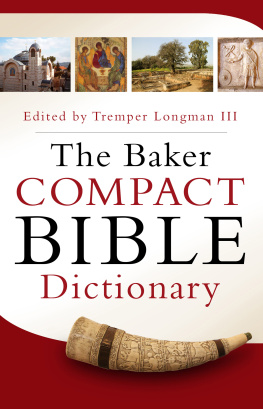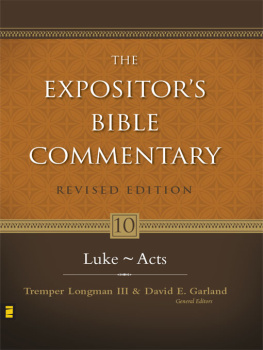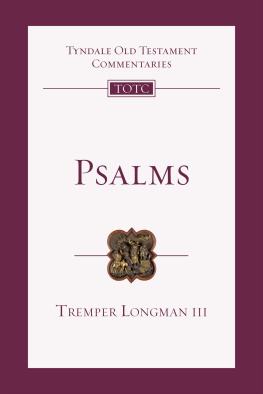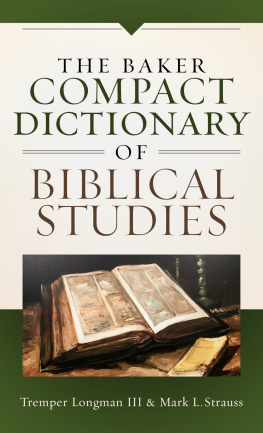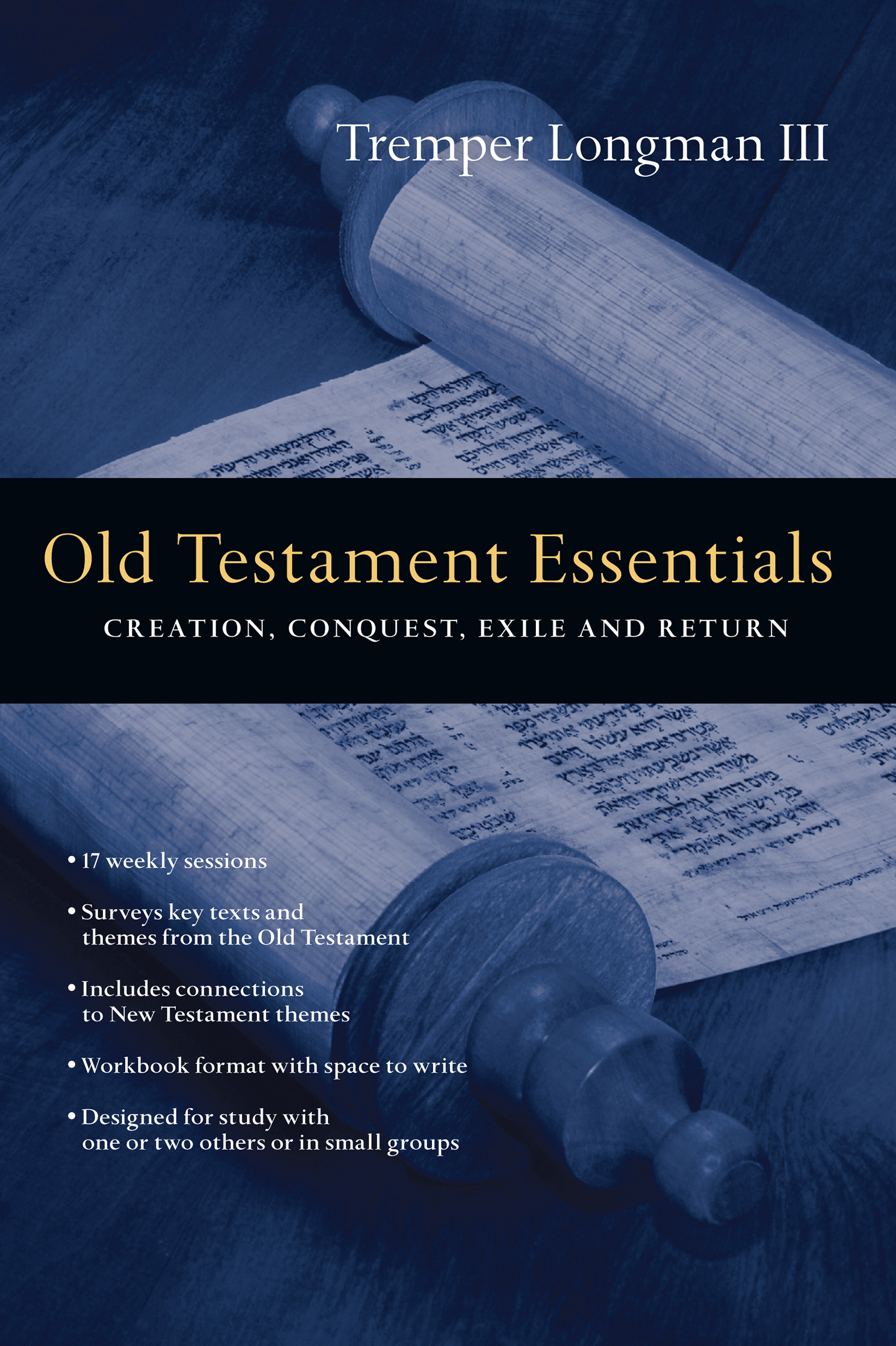To Alice
Contents
1 / Creation
God Creates the Cosmos
2 / Fall
Humanity Rebels Against the Creator
3 / Abraham
The Father of the Faith
4 / Isaac and Jacob
The Promise Continues
5 / Joseph
The Promise Survives
6 / Exodus
God Saves His People from Bondage
7 / Wilderness Wandering
God Refines His People
8 / Law
God Makes His Will Known
9 / Priests, Holy Place and Sacrifices
Coming into the Presence of the Lord
10 / Conquest
God Gives His People the Land
11 / Judges
Spiritual Confusion, Moral Depravity, Political Fragmentation
12 / Saul, David and Solomon
The Rise of Kingship
13 / Psalms
Worshipping the Lord
14 / Wisdom
Navigating the Turbulent Waters of Life
15 / Divided Monarchy
The Road to Judgement
16 / Prophets
God's Covenant Lawyers and Apocalyptic Visionaries
17 / Exile and Return
Divine Hostility and Restoration
Preface
Christians love the Bible, but they often do not know what to do with the Old Testament. First, it is simply long (it composes about 77 percent of the Bible), and thus it is often hard to keep the basic plot of the Old Testament in mind. Further, it comprises many different types of writing, not just historical books. Indeed, the historical books (GenesisEsther) contain genres other than simply narrative, for instance, law. Besides the historical books, the Old Testament contains prophecy (Isaiah, Jeremiah, Ezekiel and the twelve Minor Prophets), poetry (Psalms, Lamentations and Song of Songs), wisdom literature (Proverbs, Job and Ecclesiastes) and apocalyptic (Daniel). Each of these types of literature calls for a different reading strategy. In addition, parts of the Old Testament seem not only strange but embarrassing. Take, for instance, the wars of the book of Joshua, where God calls on the Israelites to kill every man, woman and child in Canaan, or the curses of the psalms, when the psalmist calls on God to injure and kill not only his enemies but his enemies children. What are Christians supposed to do with these parts of sacred Scripture? And finally, Christians rightly focus their attention on Jesus Christ, their Lord and Savior. But one looks in vain for the name of Jesus in the pages of the Old Testament. Isnt it better to spend our time reading the New Testament?
Of course, the answer is no. The whole Bible, not just the New Testament, is Scripture and thus authoritative to Christian life and belief. Jesus himself made a point to tell his disciples that the whole Old Testament anticipated his coming (see especially Luke 24:25-27, 44-45). The study of the Old Testament is not easy since it is distanced from us in terms of culture, time and redemptive history (that is, it was written before the fuller revelation of Christ), but it is worth the effort in terms of knowing God and knowing how we are to live our lives in a manner that is pleasing to him.
It is with that spirit that I wrote Old Testament Essentials. The Bible readings, study questions and essays that make up the following seventeen studies serve three major purposes: (1) to acquaint you with the message of the Old Testament, (2) to show you how the Old Testament points to Jesus, and (3) to show you how the Old Testament is relevant to your life. It is my hope that your use of this guide will not only enrich your knowledge of the content of the Old Testament but also deepen your love of the Old Testament, and of the One who speaks through its pages to you.
I would like to thank Cindy Bunch of InterVarsity Press for the invitation to write this volume as well as Drew Blankman who gave me excellent advice as I brought it to its final form. In addition, my good friend Ray Aromatorio used this guide in manuscript form in a Bible study he leads. He and the members of the group gave me great advice. Ray is a constant source of encouragement and support to me. Of course, any errors in the final product are my own. I would also like to thank my wife for her love for and forbearance of me over the forty years of our marriage (we celebrated it on June 23, 2013). I decided to become a professor and writer under her influence. Little did she know that she would create a monster, though my mother did warn her that I do things to death. I love you, honey.
Tremper Longman III
Introduction
How to Use This Book
Having taught for over thirty years, I know the struggle that many Christians have with the Old Testament. In the first place, the Old Testament is long, constituting over three-quarters of the Bible. Second, much of it seems strange and distant from us today. There are customs that are foreign to our experience (for example, sacrifices) and features that are deeply off-putting if not repulsive (for example, holy war).
Thus, we have a tendency to stay in the New Testament. After all, we reason, we find Jesus Christ in the New Testament, and he is undoubtedly the center of our faith. He is the one who died on the cross and was raised from the dead to save us from our sins. We dont need the Old Testament any more as long as we have Jesus.
However, the Christian church through the ages has recognized that God still speaks powerfully to us through the Old Testament. On occasion some church leaders have tried to make the argument that the Old Testament is no longer relevant and should be removed from the canon. A preacher named Marcion made the strongest case for this during the second century A.D. He believed that the Old Testament with its God of wrath was out of harmony with the New Testament and its presentation of Jesus as a God of love.
While his viewpoint became very popular, he was soon excommunicated for these views (in A.D. 144) because the broader church recognized that the Old Testament indeed was Gods word to humanity. After all, Jesus himself was a student of the Old Testament, and much of the New Testament rests on the Old Testament as its foundation.
That is not to say that the Old Testament should be read and applied in exactly the same way it was before the coming of Christ. Just to choose one obvious example, Christians do not offer animal sacrifices anymore. But does that make the laws concerning sacrifice in the Old Testament irrelevant (Leviticus 17)? No. After all, the theological significance of Christs death on the cross can only be understood on the background of the sacrificial system of the Old Testament (see Hebrews 10:1-18).
Furthermore, Jesus himself told his disciples in no uncertain terms that the Old Testament anticipated his coming. After his resurrection, Jesus berated his disciples for being slow to believe all that the prophets have spoken (Luke 24:25). He then goes on to explain how all the Scriptures (meaning the Old Testament) pointed to him (Luke 24:26-27, 45-48).
The purpose of this guide is to help you grasp the message of the Old Testament as it narrates Gods work from the time of creation up to Israels return from Babylonian exile. We will also look at Old Testament law, ritual practices (priests, holy places and sacrifices), wisdom and praise literature, as well as the prophets. The guide will not only help you grasp the contents of the Old Testament but also teach the best way to interpret the various parts of the Old Testament.
The guide is divided into seventeen studies, each having the same structure.



